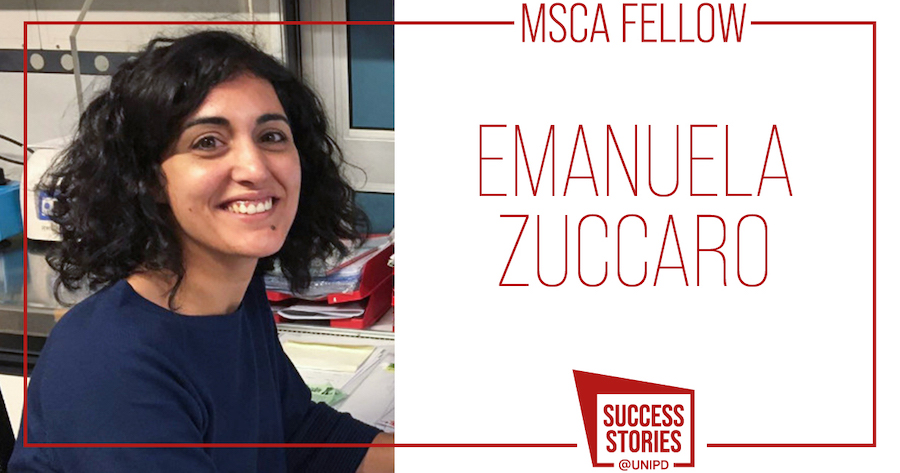
MSCA Fellow: Emanuela Zuccaro
Movement is like a mosaic: every motor neuron has its own place and role.

Emanuela Zuccaro is a brilliant scientist who has been winning several prestigious fellowships and grants in the past few years, including an Umberto Veronesi Foundation fellowship, a STARS @UNIPD grant, an AriSLA Foundation Pilot Grant and a MSCA Individual Fellowship.
Emanuela obtained her PhD in Neuroscience, Nanotechnology, Robotics and Drug Discovery from the University of Genova, Italy, in 2012. She spent her PhD training at the Italian Institute of Technology (IIT) of Genova and then moved to Harvard University (USA) where she worked as Postdoctoral Fellow until 2017.
She came back to Italy from the US to keep working on neurodegenerative diseases, especially Amyotrophic lateral sclerosis. Her research questions why do some neurons degenerate?
She is trying to write a molecular map of alpha motor neurons to answer that.
In 2019, you both won a MSCA IF and a STARS grant at the University of Padua: you seem very committed in working at our University! What makes our Institution relevant for your research and your career?
The excellent scientific environment at the University of Padua has played a key role in my commitment. I found in the University of Padua a dynamic and intellectually stimulating environment, a unique opportunity to build my career and lead my research.
Can you briefly and simply explain what your research project is about?
Neurodegenerative diseases, including Amyotrophic lateral sclerosis (ALS), are highly debilitating diseases affecting the central nervous system. Although each of them has its own genetic and/or environmental cause, onset and prognosis, the vulnerability and consequent loss or dysfunction of neurons is a common denominator. Importantly, not all neurons are equally susceptible to the disease. Some neuronal types are more vulnerable and degenerate first, while neighboring resistant neurons can stay functional even at late disease stages. The reason beyond the selective vulnerability to insults of specific neuronal class is still unknown. To contribute in filling this gap of knowledge, I focus my research on understanding what makes this neuronal type so vulnerable and look at its molecular fingerprint in physiological and pathological conditions. By investigating the characteristics of vulnerable and resistant neurons at single cell level, I will contribute to finding novel molecular mechanisms responsible for vulnerability, informing on novel therapeutic candidates.
You studied and worked as a postdoc in different Universities, both in Italy and in the US. What did you learn in such different environments? Did you experience any difference in research approaches? If so, how were you able to integrate them?
I was lucky to see different environments and distinct research approaches. They have immensely enriched my background. In the US, I have learnt about approaches and novel methods that are now crucial for my research. Moreover, I was exposed to and had the chance to interact with extremely brilliant researchers that opened my mind and stimulated me to think out of the box.
Your actual supervisor and your mentor in Harvard are both top-level female researchers: what did they teach you about being a woman engaged in research?
It is well known that women engaged in research and holding top-level positions in Academia are fewer than men; this is not just an Italian situation, it occurs worldwide. However, I have known several women both in Italy and in the US who worked hard and have had a brilliant career. Their example is driving my career plan too.
What would you suggest to a researcher who is thinking about applying for a MSCA-IF?
To someone that is determined to apply for a MSCA-IF, I would say to always think that this grant is a great opportunity for knowledge transfer. For me, this was crucial. I wanted to go back to Europe, and I wanted to transfer what I have learnt in the US. At the same time, I needed to acquire new skills, which were “available” at the University of Padua, in particular in the lab of my supervisor Professor Pennuto, with whom I have built a perfect win-win scenario.
International Research Office
via Martiri della libertà 8, 35137 Padova, Italy
tel. +39 049.827 1947 / 1948 / 1945
fax +39 049.827 1911
international.research@unipd.it


